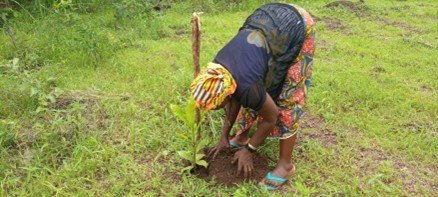This website uses cookies so that we can provide you with the best user experience possible. Cookie information is stored in your browser and performs functions such as recognising you when you return to our website and helping our team to understand which sections of the website you find most interesting and useful.
Sierra Leone
Reforestation and poverty alleviation
Mission
The mission of this project carried out by Partners in Rural Integration and Development Organization (PRIDO) is to promote and integrate local communities in tasks related to sustainable environmental management such as agriculture and reforestation of 1,400 ha with native species of trees generating important benefits with social impact.
Description
Registered in 2010 with the Sierra Leone government, PRIDO´s operations are concentrated in the Sanda Loko and Sella Limba chiefdoms, the Karene district, and the northwest region of Sierra Leone.
The project’s core focus centers on developing tools and resources for the targeted communities to fight poverty through climate change mitigation, environmental protection, access to education, food security, livelihood, and economic growth.
Objectives
- Sustainable management of 1,400 ha of environmentally degraded land through reforestation activities
- Mitigate climate change by CO2 sequestration
- Poverty alleviation by supporting community-based women and the youth by implementing sustainable activities such as nurseries maintenance, tree planting, and agroforestry implementation
- Promoting alternative livelihood practices such as beekeeping and vegetable production to create income streams for local communities
Agriculture and livestock are the main reason for deforestation in the region. More specifically, the lack of proper land management practices
PRIDO seeks a hybrid approach of tree planting, natural regeneration, and sustainable land management and conservation. The significance of implementing such an initiative is to provide practical solutions at the community level to tackle economic, social, and environmental challenges. The Project’s activities will strengthen how communities interact with their forest and land from a destructive cycle to a sustainable livelihood relationship.
By involving the community where more than 60 people are working on tasks in all stages of the project, including planning, designing, operations and maintenance, we seek to ensure its long-term sustainability of it.
Our operations so far have included crop cultivation, beekeeping, and educational initiatives.
- Crop cultivation. We operate several farms in the Sierra Leone district of Karene.
- Beekeeping. PRIDO’s activities also include providing bee pollination services and harvesting, developing, producing, and selling various honey and bee products.
- Environmental education initiatives. PRIDO’s activities also include promoting environmental protection education and creating awareness of climate change issues for children, teachers, and community members in six local schools.
Some of the indigenous trees which are being planted:
Anacardium occidentale, Gmelina arborea, Azadirachta indica, Mangifera indica, Persea americana, Moringa oleifera, Prioria balsamifera, Carica papaya, Passiflora, Psidium guajava, Terminalia ivorensis y Eucalyptus.
The enhancement of the ecosystem by reforesting 1.400 ha of native species of trees is another important ecological benefit since will provide a home for indigenous fauna like monkeys, chimpanzees, antelopes, squirrels, pythons, snails, etc.
Local Partner
PRIDO (Partners in Rural Integration & Development Organization)
PROJECT LEADER
Joe Musa, National Coordinator
PROJECT TEAM
No data

Number of Hectares to be reforested
1.400
Hectares

Cost per tree
12.1€
Euros

Cause of deforestation
Agriculture, livestock and lack of proper land management
If you want additional information about this project you can write to us at

N/A
trees
Number of trees planted












